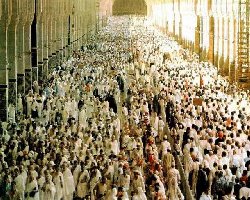The Following is a Brief Description of the Rites of 'Umrah:
1) When the one who intends to perform 'Umrah reaches the Meeqaat (place of assuming the sacral state), it is recommended for him to bathe and clean himself. The woman should also do the same even if she was menstruating or experiencing postnatal bleeding, however she should not perform Tawaaf (circumambulation) until her bleeding stops and she performs Ghusl (ritual bath).
A man should apply perfume to his body but not to his Ihraam clothes (worn in the sacral state). One bears no sin if they could not bathe at the Meeqaat; however, it is recommended to bathe when one reaches Makkah before performing Tawaaf, if convenient.
2) A man should take off all his form-fitting clothes and wear a lower garment (Izaar) and an upper garment (Ridaa') which are preferably white and clean and he should also uncover his head. As for the woman, she assumes the state of Ihraam in her ordinary clothes that should neither include adornment (designs and so forth) nor cloths of fame (fashionable).
3) He then intends with his heart to enter into the rites of 'Umrah and says, “Labbayka 'Umrah (Here I am performing 'Umrah in response to Your call)”, or “Allahumma Labbayka 'Umrah (O Allah! Here I am performing 'Umrah in response to Your call).”
If he fears that he might not be able to complete his 'Umrah because of sickness, fear of an enemy or the like, then it is permissible for him to make a condition upon assuming the state of Ihraam saying, “If something prevents me from completing my 'Umrah, then I would end the state of Ihraam whenever/wherever You detain me.” Dhubaa‘ah bint Az-Zubayr ![]() asked the Prophet
asked the Prophet ![]() for advice, saying that she wanted to perform Hajj but she was feeling unwell. The Prophet
for advice, saying that she wanted to perform Hajj but she was feeling unwell. The Prophet ![]() said to her, “Perform Hajj and put a condition (when assuming Ihraam) saying, "I will end Ihraam at the place where You detain me…” [Al-Bukhari and Muslim]
said to her, “Perform Hajj and put a condition (when assuming Ihraam) saying, "I will end Ihraam at the place where You detain me…” [Al-Bukhari and Muslim]
Then, the person performing 'Umrah should make the Talbiyah that the Prophet ![]() used to say, by saying:
used to say, by saying:
"Labbayka-Allahumma Labbayk. Labbayka Laa Shareeka laka Labbayk. Inn-al-Hamda wanni’mata laka wal-mulk. Laa Shareeka laka.” (Here I am responding to Your call, O Allah; here I am responding to Your call. Here I am responding to Your call. You have no partner. Here I am responding to Your call. Surely, all praise, grace and dominion is Yours, and You have no partner).
One should make Talbiyah, mention Allah and supplicate to Him frequently. Upon reaching Al-Masjid Al-Haraam (the sacred Mosque in Makkah), it is a recommended for one to enter it proceeding with his right foot first and saying:
"Bismillaahi, was-Salaatu was-Salaamu ‘alaa rasoolillaah. A‘oothu billah-il-‘Atheem, wa bi wajhih-il-Kareem, wa bi sultaanih-il-Qadeem min ash-Shaytaan-ir-Rajeem. Allahumma Iftah Li Abwaaba Rahmatik (In the Name of Allah, may peace and blessings be upon the Messenger of Allah. I seek refuge with Allah The Almighty and in His eminent Face and in His Eternal Dominion from the accursed Satan. O Allah, open the doors of Your Mercy before me.”
Then, he should continue making Talbiyah until reaching the Ka'bah.
4) When he reaches the Ka'bah he should stop uttering Talbiyah and approach the Black Stone, kiss it if possible without harming others by crowding. When touching the Black Stone, the person performing Tawaaf should say, “Bismillaahi, Allahu Akbar (In the Name of Allah, Allah is the Greatest)” or just, “Allahu Akbar (Allah is the Greatest).” If he could not kiss the Black Stone, he should touch it with his hand, with a stick or the like and then kiss the object with which he touched the Black Stone. If this too is not possible, he should face the Black Stone and point to it with his hand or anything saying, “Allahu Akbar (Allah is the Greatest).” without kissing what he pointed at the Black Stone with. Ritual purity is a precondition before one is allowed to perform Tawaaf. Therefore, ending the state which requires Wudhoo' and the state which requires Ghusl is a condition for the validity of the Tawaaf, because Tawaaf is like performing prayer, except that speaking is allowed during it.


 Home
Home Discover Islam
Discover Islam Quran Recitations
Quran Recitations Lectures
Lectures
 Fatwa
Fatwa Articles
Articles Fiqh
Fiqh E-Books
E-Books Boys & Girls
Boys & Girls  Hajj Rulings
Hajj Rulings Hajj Fatwas
Hajj Fatwas














